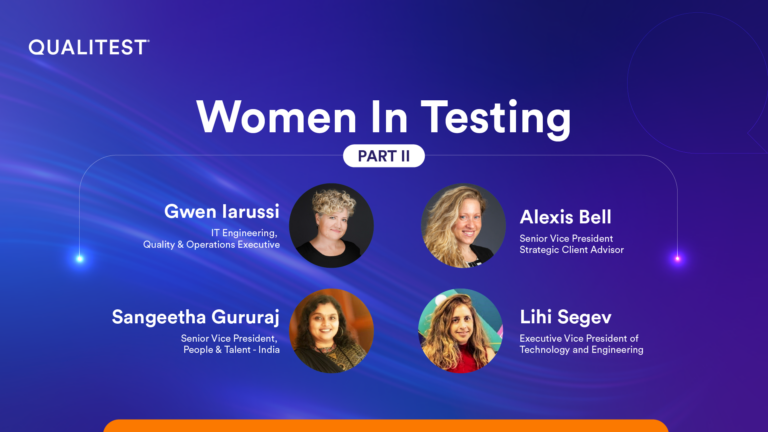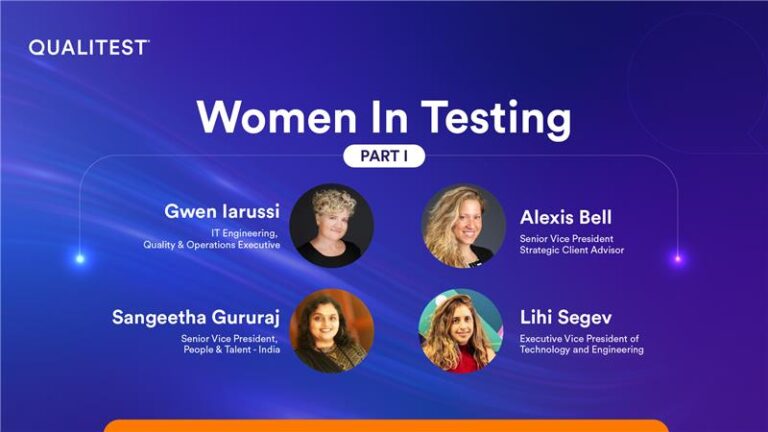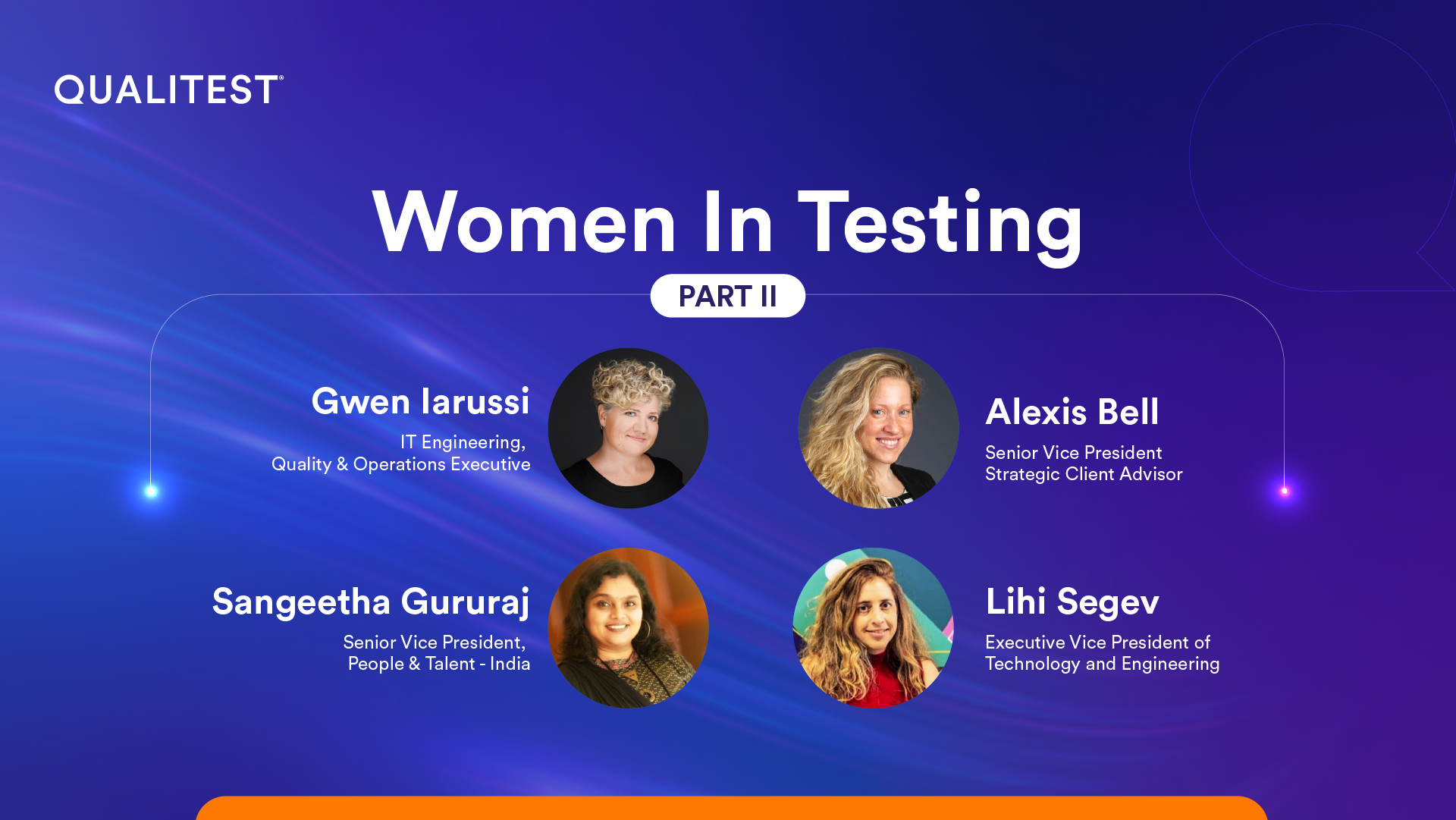
Panelists


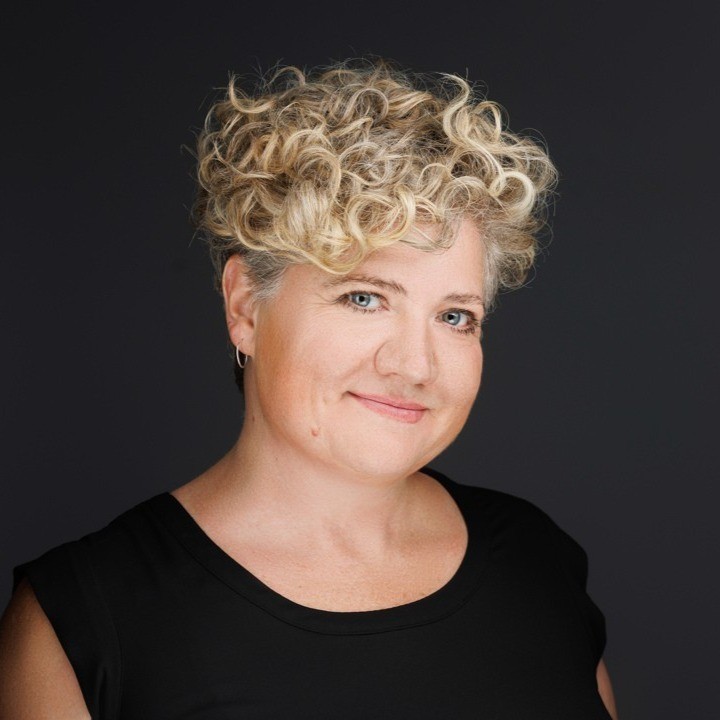
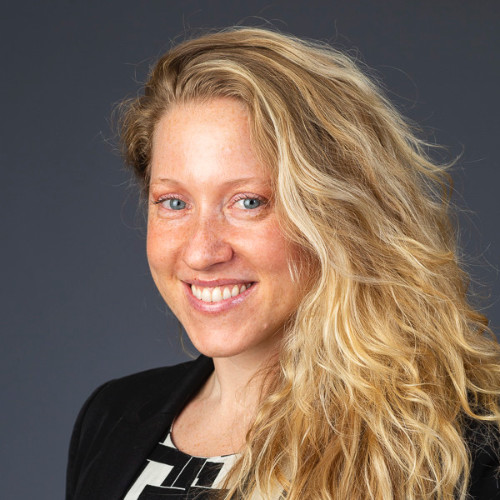
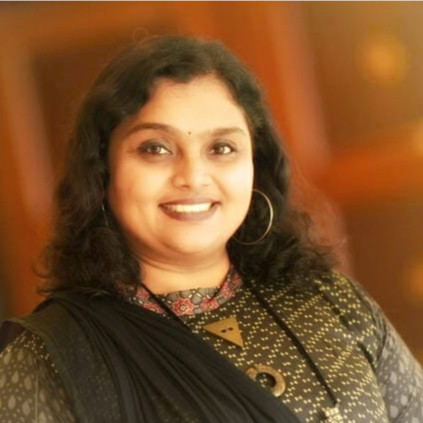
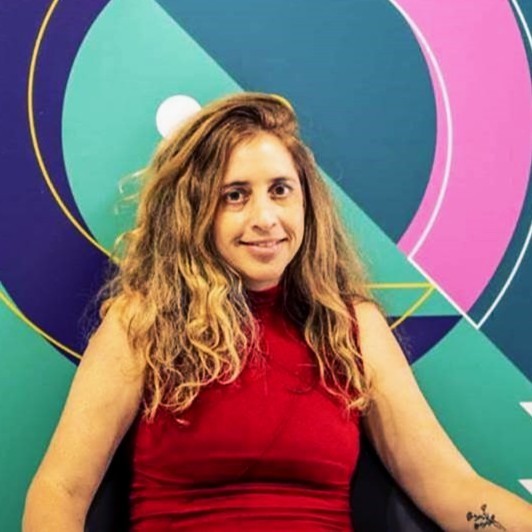
Michael Larsen (INTRO):
Hello, and welcome to The Testing Show
Episode 152
Women In Testing, Part 2
This show was recorded Friday, February 28, 2025
For the second part of our Women In Testing conversation, guest moderator Gwen Iarussi continues the conversation with Alexis Bell, Sangeetha Gururaj, and Lihi Segev about challenges faced by women leaders, strategies for overcoming bias and creating opportunities for diverse talent, stepping outside of comfort zones, and making the first or next move in a dynamic and changing work environment.
And with that, on with the show…
Gwen Iarussi:
I think one of the things that this highlights is that we’ve all had very diverse experiences, some similar challenges I think in our experiences kind of gaining traction in our career, making that next step. I don’t know if that’s a trend that you’re seeing in your environments, but as organizations are facing this cultural shift, how do we move past that? You say the term DEI and everybody’s feathers start to get ruffled and we start to get polarized and start taking our stances and I think part of us getting through this is moving past that and looking at opportunities for us to create the right spaces for people to grow of all colors, of all backgrounds of all, you name it. In terms of moving beyond just the awareness that we need to be better about creating spaces for all humans to be successful, what have you seen, what is Qualitest doing today to create those spaces and what are you seeing have the most effect on it?
Sangeetha Gururaj:
Before I start with what we are doing in Qualitest, I also have a view on this. Some of these movements over the years were required to increase acceptance and awareness. Today, how Michael spoke about the acceptance part of it, it took quite a few years to come in different countries and different spaces. So these movements are essentially at different levels. Now. It could be a very advanced level in certain spaces in the world and it could have taken a lower traction earlier and coming up. The existence of these movements means that there was lesser awareness and acceptance in the past, so they were essential to come to a stage. But then what I always endorse is when we keep seeing equality, we should ensure that we show it in the different phases of any work environment. And I always say that if we drive it merit based, so as long as it is performance related, any decisions that are taken should not be based on aspects of only diversity or aspects of anything, but it should be merit based.
Sangeetha Gururaj:
So if there is a task assigned who did the task extremely well? Who got the opportunity to do the task also should be those who performed extremely well in the past or show high potential and promise. So to come to that angle, companies have to start looking beyond everything and diverge or converge everything into again monitoring, ensuring that the right talent is given the right role. So everyone starts thinking merit based. Yeah, merit based. That would help go beyond these movements and that’s what we encourage in Qualitest as well. We do have our diversity related initiatives, we have quality pride and we have the women’s forum that all of us are very actively involved where we do mentorship programs for the women, we reach out and also we have webinars and we have external leaders coming in, women leaders coming in, sharing their journey.
Sangeetha Gururaj:
All of this is to increase the awareness acceptance as well as give women the voice that they need and show them that hey, we are here to support you. I have been part of the mentorship program, I’m sure Lihi and Alex can add as well, and the questions they ask us, we have already lived with that and we know that exact answer and we go back, I’m so satisfied saying that we have helped women to do something much easier than what we went through 10 years back. It was quite tougher for us. So I think these are the initiatives that really matter and I’m sure many companies are doing that and that has opened the door to more talent coming forward and then the choice should still be merit based. The biggest obstacles for this is men who think that too many diversity initiatives are being happening and women who go too feminist both are actually obstacles
Gwen Iarussi:
That polarized view. Yep.
Gwen Iarussi:
And both actually become the obstacles for it. Yes, and also the fact that whatever you overdo, it’ll never help the larger public or the greater cause. That is what we have to be conscious and many companies have beautifully handled that being very conscious about it and the only thing that works is going merit based and I’ve seen that over the years and by experience and to map that, we need the lens of equality and that comes with awareness and acceptance. So it is actually a vicious cycle. We have to
Gwen Iarussi:
one big old cycle, right?
Sangeetha Gururaj:
It does, yes.
Gwen Iarussi:
Lihi and Alexis, you all are on more of the operational side. You are leading teams in many cases. I’m sure you’re involved in hiring and career development of the teams reporting into you. What are you seeing have the most impact in terms of creating opportunity and making sure that diverse voices are being heard and that diverse talent is getting those opportunities to shine?
Alexis Bell:
Thinking about what Sangeetha said, having things be merit-based, I think it’s important. If anyone’s doing well, speak up highly about them, speak up to senior leadership, highlight them, put them in front of whoever it is, give everybody opportunities to shine, to rise to be seen. That’s something that we can do. When you’re hiring, again, it’s merit, but look harder. How do you get some diverse candidates? Where are people not looking? Where are people looking? What might be some of the limitations when you’re doing LinkedIn searches or job descriptions, you have to figure out how those can also be inclusive. I think it’s our job. I think it’s our role. We all need to take the extra time to do that. Make sure you have a diverse pool of candidates. So I like that things are, you want to go on merit. We’re not hiring somebody because they’re a woman, but you definitely want to make sure that we have the candidates there.
Alexis Bell:
You’re not hiring somebody because they’re whatever diverse, but you want to make sure that we have that pool. If you just have the same exact pool, it’s not going to work. I also think the sponsorship thing is really important. I’ve been really lucky. I’ve had sponsorship. You have to have mentors and you have to be a mentor and you have to sponsor. I got where I am today because I have mentors and leadership has allowed me the opportunity and when I moved into my first tech job, it’s because somebody took a chance on me. So you have to take a chance on somebody as well. If you just wait for somebody to have proven themselves, you’re missing out on anybody who has potential. So you do have to take a risk as well. I think that’s part of what we need to do as leaders.
Gwen Iarussi:
Awesome. Lihi?
Lihi Segev:
I agree with Sangeetha and Alexis and also about the conscious and the true over widening and looking all the time and monitoring ourself. I would say looking at myself and my experience and what I feel like that is contributing maybe daily is I would try to call it self promotional, but how can you do self-promotional, right? If you have any kind of a background, I’m not speaking even only about women. I can see some of the people even with different region, at least from Israel, you have a lot of communities, sometimes they are minors and we are walking with them and to see a lot of the time those employees, potential managers, they are behind the scene don’t always want to make their voice and it’s something that we need to help them and I think that we are as leaders, this is our place to go a little bit beyond our daily work and to see what we can do more, at least for my managers, not even the daily employees, and then I expect them to do the same with their employees is to take them out of their boundaries a little bit out of the comfort zone to ask them to write an article to ask them to participate or to be the one to represent anything that I could have done easily.
Lihi Segev:
This is my point of view for pushing them a little bit in a good way. If someone is not ready for that, that’s fine, but most of the people usually take it as a compliment and they like the challenge and it takes them to the next step.
Gwen Iarussi:
You all hit on something that I think there are some commonalities even though you have these different perspectives, the things that stand out when I’m hearing you all are things like staying curious in your role, not only for your own career development and opportunities for yourself to get out there and get outside of your comfort zone, but also as a mentor, as someone who is now paving the way for others to come into this world and make their own mark. Digging in and discovering that talent, taking that on as a personal responsibility as a leader in an organization, no matter who you are, whether you’re a woman or a male leader, it is something we all are responsible for as leaders. And I think it’s sometimes easy to forget that you get really complacent and you get into the day-to-day problems and you don’t really think about the larger talent development piece of your role.
Gwen Iarussi:
You bring up these really great points in terms of looking for the talent and maybe searching in areas that wouldn’t be your normal go-to places or your normal conversations and digging in and maybe looking at some of these individuals and Alexis as you mentioned, giving people a chance that maybe just are waiting. So all great fantastic points. On the opposite side of that, I don’t want to undermine the fact that it continues to be a challenge for women, especially at the leadership levels to not only stay at that level but also be in that environment and be successful. And so one of the things that when we talk about bias and you see bias at the top and I think you actually see quite a bit more bias even at the top than you do and maybe that’s a byproduct of the pool of positions are a lot smaller and so you’re dealing with a much smaller set of individuals in that regard and so by nature it’s a lot more difficult to succeed and grow in that space.
Gwen Iarussi:
But as women leaders who are in this space, what are you seeing as some of the biggest challenge you’re facing and how are you approaching that? When we talk about bias and when you experience small things in the workplace that get you into that mode of you know what, I want to quit tomorrow. I think one of the statistics I looked at recently is 47% of women in technology roles want to quit every week. I’d love to see the research on that, but I can speak to that. There are multiple days a week where why am I doing this? Can I go bake bread somewhere and just be done? And I think that’s a very real part of this and yet here we are, we’re continuing to be in these spaces. So how have you overcome some of this bias? What are some of the challenges that you’ve taken on personally and how are you tackling that in your day to day?
Lihi Segev:
I can share one… close to my heart, but I think for most of the people, majority of the population, let’s speak about microaggressions. You will always see it in the street and also in work. I do think that a lot of the time this microaggression is unintentional and you see this person and you understand where he comes from. You understand either he is angry, either is unsatisfied or even just hurt not in a good state right now. And we sometimes dismiss it and we’re saying, hey, this is not a big deal. I had such a thing last week and I was thinking a lot if to raise it, if to make it a lesson learned or not because I understood where it came from, but when the week continue, this thought didn’t left me, I decided not to allow it. So I think this is very important not to dismiss events because it can go back and it’s a bad example to the people who are surrounded by that, impacted by that or the person himself that is the cause of that.
Lihi Segev:
I think that if he’s responsible enough, he needs to learn. We need to call out this bias usually in real time, maybe not to wait for a week. In this case I wasn’t there, I just got the feedback, but it doesn’t matter. It took me a week to handle it. Also speaking for myself, I think we should not allow it. We should not dismiss it. And I think this is the culture and important stuff that should not make us say something like you mentioned I want to quit again this week because this is what happened to me. It helps us to reinforce culture and respect. I think it’s very important.
Gwen Iarussi:
Yeah. Sangeetha? Alexis?
Sangeetha Gururaj:
So in my case It’s very tough now, Gwen, because what gets us here might not take us there and now we also recognize all the biases. Earlier maybe I was subject to a bias and I didn’t understand. I used to only feel bad about it and then some advocacy would happen and I would grow out of it. I go self advocate and I get, but now we, because we’ve seen it so much and I have worked very closely with so many leaders in the past and now we can see it so clearly. So the first thing we have to do is call it out and coach anyone who does it. I’ve seen biases in women as well. It’s not when you’re in leadership roles after a point of time we all think alike and it all becomes very black and white sometimes and there are biases. They’re still unintentional. It’s like a black hole.
Sangeetha Gururaj:
They have no clue that this is happening with them. So we have to call out the biases and show that this is how it is. So now because we know it and it is very clear, I also went through it myself. When it happens and you’ve recognized it and it has happened to you, you still are in a stage where you don’t know what to do and that was very tough. That’s why it happens at any time there is allyship, the friendship and the support that you receive when you are in the room. And then there is advocacy is the support you receive when you are not in the room and someone is advocating for you and that helps your potential be tapped somewhere else and you have to start seeking for that advocacy and we are in a stage where we can go ask for it.
Sangeetha Gururaj:
Advocacy is much higher than allyship and that’s what might take us to the next level. We have to seek for it and go to it and you have to do that whole, I felt that I had to go through the drill all over again and you still get subjected to it at any level and it is okay now at least you recognize it and then you know what to do around it and then you move forward, which will always remain tough I think. And we have to call it out always. I think we should call it out nicely and explain to the person because they will never take it well because nobody wants to hear that, Hey, you are biased. For sure. Good part is that it’s part of my job so I get to get away with saying that.
Gwen Iarussi:
Yeah, and I was going to say, being in HR, you probably see this on the regular when addressing it, when calling out these things, what advice would you give for doing that in a way that doesn’t trigger that guilt mechanism? There is a shame mechanism and Matt, I know we’ve talked a little bit about this in terms of the shame mechanism that can get triggered when we start throwing out these terms and we start having topics like this and if we call out something as a microaggression that can immediately trigger that shame response and put up the defensiveness, which is the last thing we really want. To your point, it’s about continuing to raise awareness to acknowledge the fact that some of these things that we’ve done historically aren’t conducive to achieving what we’re after here. What would you recommend in terms of how to approach that?
Sangeetha Gururaj:
See people are also practical. So when we approach and say that what has always worked does not directly say, Hey, you did this and see it looks like this because I’ve already given my opinion about it and that triggers the defensiveness almost immediately. Giving examples of some other case has always, always helped me have the leader think internally. So the example I quote is of something else that has happened to someone else and here I have a feeling that this is how this may look. Do you want to reconsider? The example says that it’s not happening here, it’s happened to someone else, but do you want to reconsider and relook? Immediately the bias is acknowledged and recognized, but at least it’s not confrontational. So we start with that and then we are given an opportunity to coach and it depends on the allyship we have with the leaders that we’ve called it out, but giving a neutral example and then saying that this looks very similar, do you want to reconsider at least 99% of the times I have not seen the person be defensive if the approach outside in first.
Gwen Iarussi:
Alexis, what about you? How are you tackling that bias from your perspective?
Alexis Bell:
I think the first step is identifying them because sometimes they’re very subtle. With consulting and what we do, it’s great and powerful to be able to put things into frameworks and say, okay, we can break this down and make everything digestible. Again, I have mentors and people who coach me how to do this. Some examples that really frustrate me where I see the biases is, Michael, I think you were mentioning about how you cook for your wife and your kids. I think normalizing that so you don’t get any weird comments does really help. Having men set the norm does help a lot. It is weird to think in this circumstance we still need men to also normalize that you can’t do it in silos. My husband cooks, we both share responsibilities, but a lot of times I travel for work and I always get who’s watching the kids? How are you not home? What are your kids doing? Are they okay? Is your husband okay with this? I am sure that men are not getting that question. It’s so frustrating. I find it.
Matthew Heusser:
I wish I got that question. That would be so refreshing. I would feel great. They just assume I can do it all.
Michael Larsen:
I do want to add one thing in here just to give an additional statement, and this is just something that my daughters and I have participated for in a number of years. We have been a performing troop, the three of us in different capacities in regards to say renaissance faires and also anime and cosplay type events. A lot of the time the cosplays that my daughters have been praised on, oh wow, that looks amazing. They very happily smile and say, thanks. My dad made that. And the running joke for years has been, I am a man with a sewing machine and I am not afraid to use it. And again, it comes down to I wanted to encourage my daughters to say, look, do I know my way around a car and can I fix some things on a vehicle? Can I change oil? Yes.
Michael Larsen:
Can I change out spark plugs on a car? Sure, can I fix flats? Absolutely. But I also want to encourage them to do it. Now they may decide they don’t want to and that’s fine, but I want to give them that experience and also I want to show them, hey, I know how to make clothing. I know how to design things and make them work for this ranging anywhere from 13th century middle ages to hyper modern foam armor. And it’s something that I wanted to make sure that they knew that I did not look at anything as demeaning or beneath me, but also to show them that anything that I can do, they can do and vice versa. And that I was never going to judge them or say, oh, you don’t know how to do X? What’s wrong with you? You’re a guy that’s doing Y? What is up with that? The answer is skills are skills. Everybody should have them. Yeah, there are certain skills that are historically and traditionally associated with women, but in today’s world with the fact that technology and other factors being great equalizers, that also means that there is no reason generally speaking that a guy can’t do something that’s historically a woman’s job and that a woman can’t do something historically that’s a man’s job, frankly.
Alexis Bell:
I think identifying where the biases happen. Another place I see it, a lot of times we’ll be in a meeting and somebody will say, oh, John did this, somebody did this, somebody did that. And they’ll give everyone credit. And then when I do something they’ll say, and this was done and they refuse to say my name. I put the presentation together, whatever happened and they’ll just say, this was done. And as soon as I know that that’s happened, that a man refuses to say my name and give me credit, I know that he’s sexist.
Gwen Iarussi:
Yeah, immediately that’s what your mind goes to. Now he’s not an ally now he’s not someone I can trust.
Alexis Bell:
That one moment I know that, okay, that guy’s not an ally. I have to figure out how to change that and I have to get everybody on my side because you need to have people on your side, you need to have your supporters and then you have to have them help you create the safe space. Identifying where the biases come in. It is helpful because you know what you need to do next, but it is incredibly annoying and offensive when I’m on a call and a guy refuses to give me credit, I haven’t really solved on how to fix this.
Gwen Iarussi:
Or worse, takes credit for
Alexis Bell:
Yes, credit
Gwen Iarussi:
Or takes your position as their own.
Alexis Bell:
Exactly.
Sangeetha Gururaj:
I just have one example of for every man who doesn’t give credit, I’ve had at least two men who I would make an ally even before I go into that meeting and say, you have to say my name twice and go ahead and say that this is what’s happened. And they have done that there and it has helped. So for every man that we also have a man who would do that, it’s all about finding them for each of us.
Gwen Iarussi:
I think you make some amazing points, Alexis, and I think getting to this space where we feel comfortable, part of it is getting to that level of confidence in ourselves and in standing up for ourselves in those moments in the right way that kind of builds bridges as opposed to creating more divisiveness. I don’t know about you, Alexis, Lihi, Sangheetha. I’ve had those experiences cause real damage in my life. I tend to take those… I’m neuro spicy, so that adds a whole other level of personal taking that and going, oh man, do I really even belong here feeding into that. It’s funny you mentioned acknowledging this. I’ll give a quick story that happened recently. Our CEO at Zions Bank actually took the time. He took an hour out of his day to sit down with any woman who wanted to join the conversation and he just listened for an hour, which I found amazing.
Gwen Iarussi:
That is something I’ve never experienced in my 30 year career. The top leader of an organization just getting together to hear perspectives, to hear experiences. And what was really interesting is that he created this safe space and at one point in the conversation he kept using the word, thank you for your opinions. I really like hearing your opinions. And so I wasn’t going to call it out, but I couldn’t let the conversation end with that. And so I mentioned, and I said, it’s interesting that you use that word opinions because in a sense that can be a bias. In this type of a context, it can feel undermining to those who are sharing their experiences with you, especially around a topic that it’s just not my opinion. This is research that’s been done. It is a well-known challenge that women face. We face these things on a day-to-day basis and I think it highlights another piece of it.
Gwen Iarussi:
To your point, Sangeetha, a lot of times it’s not conscious. It’s in these really subtle unconscious ways. And so as we have these conversations, as we change the social norms and get past our own biases, Alexis, you point to something that can happen with us is that we can become rigid and it can dampen our relationship and our ability to interact in a healthy way with those individuals because now we see them as someone who’s not safe. Getting to a point where we can have the right conversations in the right ways and start helping create even more awareness on the small little things that continue to happen that make it discouraging to come back to work tomorrow. And Michael, your point around getting outside of those social norms, there’s a lot to be learned and there’s a lot to be gained from looking at getting out of our assumptions and moving past our assumptions about people and staying curious in these situations. I relate to every one of your experiences. We’re getting to the end of the hour here. If you were to give women who are just entering this space and really trying to get their leg in the door, get to that next role, what would be your number one recommendation for them as someone who’s gone through it? Lihi, you want to start us off?
Lihi Segev:
Okay. I think the first thing for anyone who would like to promote himself, and again, shouldn’t be only women, is to understand or to visualize which roles or where he can see himself. It shouldn’t be one could be one, two or three. Where is his next place he wants to be? What is your next place that you want to put yourself? Most of the time people do not do this to themself ever. Also in management, we don’t have time, so it’s kind of imposing to think what is the next step? And then there’s a lot of ways how to get there, but I think you need to envision one, two or three options. What is the next step? By the way, it can be also home working dad like my partner and it’s great for me. And again, that’s the question, where do you want to be and how to get there? That the next one. So maybe the first one is where do you want to be? Yeah.
Gwen Iarussi:
Awesome. Alexis?
Alexis Bell:
So I think it’s important to be confident to bring value. I think every day you should look at your day, did you bring value? Who did you do that for? Give credit where it’s due. If you’re coming in new or you want to get promoted, it’s still nice to lift other people up and give credit. Once you do that to somebody, they put their guard down, they put their gate down and you become an ally. So I think that’s important no matter what level you’re at. I think that shows a lot of confidence. Also be humble and it’s a fine line. I think you have to be confident and be humble because nobody likes somebody who’s cocky.
Gwen Iarussi:
Yeah, be confident but not self deprecative maybe, which is hard at times. I know. Sometimes that cuts the tension.
Alexis Bell:
Yeah, be confident, bring value, give credit, lift people up and be humble.
Gwen Iarussi:
Okay, Sangeetha?
Sangeetha Gururaj:
I would always say stand up for yourself because you’ll always find support If you stand up for yourself first, find your voice, say that out loud and clear. Let’s not fall into the victimhood because there’s a lot of information that keeps flowing in. And just at the entry level itself, the women will feel, oh, I’m going to be judged in these ways. Don’t fall for it. Everyone’s journey is different. So stand up for yourself. Like Alexa said, create value from your talent. If you can create value, stand up for yourself. Your voice will be heard. There is an ecosystem now that will definitely support it.
Lihi Segev:
You have it also in yoga. I had a good instructor. He finished each lesson, what good deed have you done today? So it’s kind of all related to the value. It’s a very good question to ask each day. I just want to say I agree.
Gwen Iarussi:
Agreed. Michael, any tips from your end?
Michael Larsen:
I think the best thing that I can suggest, a memory that I had about 30 years ago when I was working out in a gym and I got a chance to meet the most amazing dedicated and aggressive aerobics instructor at the time, that was a very hip thing to be part of and see what was happening. Just wanted to mention this because the lady that ran these classes was not what you would call a conventional fitness person. She was about five foot six and I think she weighed about two hundred and forty five, two hundred fifty pounds at least. I remember her saying that she was a, pardon the expression, in air quotes, bigger woman, but she could run everybody into the ground and she did it all day long. I asked her one time, I said, I hope this doesn’t come across as rude, but you’re working out physically all day long, but yet we’re so used to this perspective that if you were doing this, wouldn’t you be a hundred pounds soaking wet?
Michael Larsen:
And she said, yeah, if I had a typical physiology, I guess I would be, but I don’t. I have a thyroid condition that for whatever reason, I cannot have that body type. It just doesn’t happen. It’s my genetics. But I sought to prove that just because I’m shaped a certain way or because I look a way that people don’t expect does not mean that I am not capable of driving any fitness bro or fitness girl into the ground. And she could. That’s the thing that I learned from that is you’ll have these experiences that completely confound your expectations and if you get a chance to have those, enjoy them, learn from them and embrace them.
Gwen Iarussi:
From everyone I’m hearing, keep going. Get in there, advocate for yourself. And I think one of the things that stands out from all of you is maybe know thyself, which is something that I think is a key to good leaders of any kind as we wrap this discussion up. Thank you so much all of you for joining the conversation today. I hope it has proven to be a valuable time spent. Thank you all for joining.
Alexis Bell:
Thank you for the opportunity. This was really inspiring and it’s always nice to be listened to, heard, supported, and get to share what everyone else is going through. I love these kind of conversations, so thanks for including me. It’s been awesome. I really appreciate it. I want to listen to this podcast. I can’t wait. Thank you.
Lihi Segev:
Likewise.
Sangeetha Gururaj:
Plus one. Thank you so much.
Lihi Segev:
Yeah, likewise. It’s great to be inspired and I was so thank you for all of you. So thank you.
Lihi Segev:
Thank you all for joining the conversation today. It’s been very insightful and encouraging and inspiring. And thank you to all listeners out there. And join us next time on another testing show and we’re signing off. Goodbye. Thanks Everybody. Goodbye. Thank you. Goodbye. Thank you.
